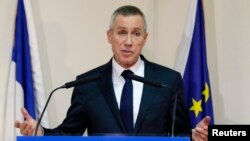In the Normandy town where he grew up, Maxime Hauchard was known as a nice young man who liked movies and tinkering with motorbikes. He converted to Islam, but apart from that, nobody remembers anything remarkable about him.
Hauchard's Facebook page tells another story. It shows the 22-year-old Frenchman dressed in combat clothes and posing with a weapon. By this time he's in Syria — a member of the Islamic State group that has carried out a brutal campaign of torture and killings.
In a Skype interview with French television a few months ago, Hauchard said he converted to Islam at age 17. He said he learned about the religion through videos posted on the Internet. He said he received no organized help from jihadists when he left France — going first to Mauritania, then heading to Syria.
This past week, the French government announced Hauchard was among Islamic State members filmed as they executed Syrian soldiers. The government also identified a second French national in the video — another convert to Islam, Mickael Dos Santos — although subsequent evidence suggests his may be a case of mistaken identify.
At a news conference a few days ago, French Interior Minister Bernard Cazeneuve issued a call to French youth to "open their eyes" to the reality of the Islamic State and its affiliates. These preachers of hate, Cazeneuve said, need to be seen for what they are: criminals involved in barbaric acts.
The government estimates more than 1,000 French nationals have headed to Iraq and Syria to join jihadi movements. Nearly one-quarter of them are like Hauchard — young people raised in Christian or even atheist households who converted to Islam.
'Not a new phenomenon'
Geopolitical analyst Alexandre Del Valle, author of a new book called Syrian Chaos, said there were French converts to radical Islam two decades ago, when France faced another wave of terrorist attacks.
"It's not a new phenomenon," he said. "What is new are two things. First, they are more numerous, and second, they are not trained and educated and recruited by terrorist networks. They are more and more recruited by themselves, thanks to the Web and the social (media) networks."
Sociologist Loic Le Pape told French radio that the government underestimates the true number of converts.
French Muslims who have joined the jihad in Syria and Iraq have the same background as those who converted from other faiths. They come from homes that were not particularly religious. They have been totally transformed — or reconverted — by a universe that embraces violence and death.
The question facing the government — and French society — today is: Why do they convert?
It seems particularly puzzling in the case of Dos Santos. The son of Portuguese immigrants, he was raised Catholic and wore a cross around his neck. His friends say that a few years ago — and within the space of three months — he turned to Islam. Last year, he left to join the Islamic State in Syria, although it's unclear whether he was in the video of the soldiers' executions.
Search for values
Former French intelligence officer Louis Caprioli thinks he has one answer. Young French are converting or returning to Islam because they seek a set of values or reference points in their lives, he said. Young Catholics like Dos Santos, Caprioli added, see a certain rigor in Islam that they do not find in the Catholic Church.
Analyst Del Valle has another explanation. He said France and other Western nations are beset by too much self-hatred and self-criticism in public discourse. So it is no wonder, he said, that young people are attracted to radical Islam, which blames the West for the world's problems.
"We always say that we are the worst," he said. "And if you hate yourself … if you hate the West, it's absolutely logical to convert to Islam, because it's the religion that criticizes the West the most — and (criticizes) Christianity and Judaism."
Today, France is trying to figure out how to stop the process of radicalization, and what to do with French who are already radicalized. There's no time to lose. French fighters are already returning from Syria and Iraq. Some people are calling for deradicalization programs. Others, like Del Valle, are pushing for a united and mainstream brand of French Islam as a counterweight to extremism.
The pull of radical Islam is raising many questions. And for now, there are very few easy answers.




